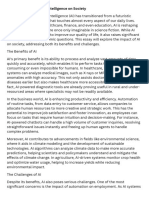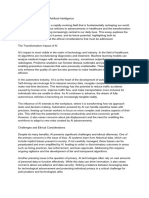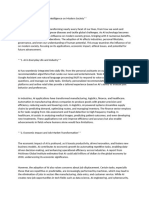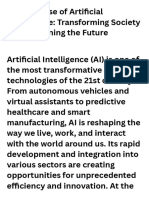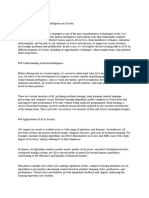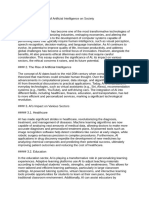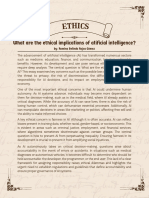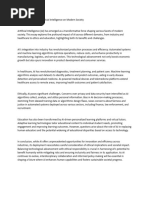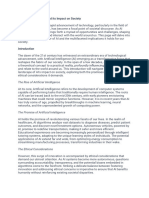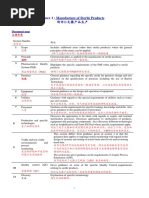uiqwxbtbxa
uiqwxbtbxa
Uploaded by
australianjedi1138Copyright:
Available Formats
uiqwxbtbxa
uiqwxbtbxa
Uploaded by
australianjedi1138Copyright
Available Formats
Share this document
Did you find this document useful?
Is this content inappropriate?
Copyright:
Available Formats
uiqwxbtbxa
uiqwxbtbxa
Uploaded by
australianjedi1138Copyright:
Available Formats
The Future of Artificial Intelligence: Opportunities and Challenges
Introduction
Artificial Intelligence (AI) has emerged as one of the most transformative
technologies of the 21st century, reshaping industries, economies, and societies.
From self-driving cars to sophisticated medical diagnostics, AI's capabilities
continue to expand rapidly. While the opportunities AI presents are immense, so too
are the challenges it introduces. This essay explores the future of AI by analyzing
its potential benefits, ethical concerns, and the role of regulation in mitigating
risks.
Opportunities Presented by AI
One of the most significant advantages of AI is its potential to enhance efficiency
and productivity across various sectors. In healthcare, AI-powered diagnostic tools
can identify diseases more accurately and at an earlier stage than human doctors.
AI-driven robotic surgeries reduce human error and improve precision, leading to
better patient outcomes. In finance, AI algorithms detect fraudulent transactions
in real-time, protecting consumers and businesses from cyber threats.
Additionally, AI contributes to environmental sustainability. Predictive analytics
and machine learning models optimize energy consumption, reducing waste and
lowering carbon footprints. Autonomous systems in agriculture help maximize crop
yields while minimizing water and pesticide usage, promoting food security for a
growing global population.
AI also drives innovation in creative industries. Generative AI models assist
artists, writers, and musicians by providing inspiration and automating repetitive
tasks, enabling them to focus on more sophisticated aspects of their work. In
business, AI-powered chatbots and virtual assistants streamline customer service,
offering instant and personalized responses to user inquiries.
Ethical and Societal Challenges
Despite its advantages, AI raises serious ethical and societal concerns. One major
issue is the displacement of jobs due to automation. While AI creates new
opportunities, many traditional roles become obsolete, requiring workers to reskill
and adapt. The economic impact of AI-driven job losses must be addressed through
educational reforms and government policies promoting workforce transition.
Bias in AI systems is another pressing issue. AI models are trained on historical
data, which can contain biases reflecting societal inequalities. This can lead to
unfair outcomes in hiring processes, loan approvals, and law enforcement decisions.
Addressing bias in AI requires transparent data collection practices, diverse
training datasets, and rigorous testing to ensure fairness and inclusivity.
Privacy concerns also arise as AI systems collect and analyze vast amounts of
personal data. The widespread use of AI in surveillance and facial recognition
technologies threatens individual privacy, potentially enabling authoritarian
regimes to suppress dissent. Striking a balance between security and privacy is
essential to prevent the misuse of AI-powered surveillance tools.
The Role of Regulation and Governance
To mitigate AI-related risks, robust regulatory frameworks must be established.
Governments and international organizations should collaborate to create policies
that ensure AI is used ethically and responsibly. Regulatory measures should
include guidelines for data privacy, algorithmic transparency, and accountability
for AI-driven decisions.
Additionally, AI research should prioritize human-centric development. Ethical AI
frameworks, such as those proposed by the European Union and the United Nations,
emphasize principles like fairness, accountability, and non-discrimination.
Companies developing AI technologies should adhere to these standards to foster
public trust and prevent harmful consequences.
Moreover, interdisciplinary collaboration is vital for the responsible advancement
of AI. Engineers, ethicists, policymakers, and sociologists must work together to
anticipate AI’s impact on society and proactively address challenges before they
become critical issues.
Conclusion
The future of AI holds tremendous promise, but it also demands careful navigation.
While AI enhances efficiency, drives innovation, and contributes to societal
progress, it simultaneously presents ethical dilemmas, economic disruptions, and
privacy risks. The responsible development and regulation of AI technologies are
crucial to maximizing benefits while minimizing harm. By fostering collaboration
between stakeholders and implementing ethical AI practices, humanity can harness
the power of AI for a better, more equitable future.
You might also like
- Fundamentals of Environmental Studies PDFDocument245 pagesFundamentals of Environmental Studies PDFKeshav MishraNo ratings yet
- Solar Energy For Future World A Review-1-3Document3 pagesSolar Energy For Future World A Review-1-3Magali PosadaNo ratings yet
- C1 Progress Test 3Document5 pagesC1 Progress Test 3Angie LaNo ratings yet
- Impact_of_Artificial_Intelligence_on_SocietyDocument1 pageImpact_of_Artificial_Intelligence_on_SocietySohanur RahmanNo ratings yet
- The Impact of Artificial Intelligence On SocietyDocument2 pagesThe Impact of Artificial Intelligence On SocietyElla GetaladoNo ratings yet
- The Impact of Artificial Intelligence On SocietyDocument2 pagesThe Impact of Artificial Intelligence On Societychristine100% (1)
- The Impact of Artificial Intelligence On SocietyDocument3 pagesThe Impact of Artificial Intelligence On Society......No ratings yet
- Task 2 artificial intelligence (AI) BAND 7+Document4 pagesTask 2 artificial intelligence (AI) BAND 7+Nguyên Trương HạnhNo ratings yet
- Essay On AIDocument2 pagesEssay On AIraghadabd436No ratings yet
- Artificial Intelligence and Its Societal ImpactDocument5 pagesArtificial Intelligence and Its Societal Impactdra2gon17No ratings yet
- The Impact of Artificial Intelligence On Modern SocietyDocument2 pagesThe Impact of Artificial Intelligence On Modern Societymikaelanava90No ratings yet
- The Influence of Artificial Intelligence On Modern SocietyDocument4 pagesThe Influence of Artificial Intelligence On Modern SocietyJames BolchoverNo ratings yet
- The Ethical Implications of Artificial Intelligence in SocietyDocument2 pagesThe Ethical Implications of Artificial Intelligence in Societybe10253.19No ratings yet
- New Microsoft Word DocumentDocument2 pagesNew Microsoft Word Documentziak.alexander.gjabelNo ratings yet
- The Role of Artificial Intelligence in Shaping the FutureDocument3 pagesThe Role of Artificial Intelligence in Shaping the FuturevvkchowdaryNo ratings yet
- The Future of Artificial Intelligence - Opportunities and ChallengesDocument6 pagesThe Future of Artificial Intelligence - Opportunities and Challengeskgnmk1997No ratings yet
- The Rise of AIDocument2 pagesThe Rise of AIkundrapu sanyasi naiduNo ratings yet
- ### The Rise of Artificial Intelligence Transforming Society and Redefining The FutureDocument17 pages### The Rise of Artificial Intelligence Transforming Society and Redefining The Futuredevil 124No ratings yet
- Artificial Intelligence Transforming the World with Innovation and ChallengesDocument3 pagesArtificial Intelligence Transforming the World with Innovation and ChallengesbarnesNo ratings yet
- ai babuDocument2 pagesai baburkoxbkpylfNo ratings yet
- Ethical_Implications_of_AI_in_SocietyDocument3 pagesEthical_Implications_of_AI_in_SocietyJuan Carlos Peñaloza EspejoNo ratings yet
- The Ethical Implications of Artificial Intelligence in Daily LifeDocument2 pagesThe Ethical Implications of Artificial Intelligence in Daily Lifedragonguy6622No ratings yet
- Resume pdf-13Document1 pageResume pdf-13ittosaachiNo ratings yet
- The Looming Threat of AI: A Double-Edged SwordDocument1 pageThe Looming Threat of AI: A Double-Edged Sword⸻⸻⸻⸻⸻⸻⸻⸻⸻⸻⸻⸻⸻⸻⸻⸻⸻⸻⸻⸻⸻⸻⸻⸻⸻⸻⸻⸻⸻⸻⸻⸻⸻⸻⸻⸻No ratings yet
- The Impact of Artificial Intelligence On SocietyDocument4 pagesThe Impact of Artificial Intelligence On Societybilos96573No ratings yet
- New Microsoft Word Document (9)Document2 pagesNew Microsoft Word Document (9)rashidmkabirNo ratings yet
- TheDocument2 pagesTheLalalaland77No ratings yet
- The Future of Artificial IntelligenceDocument2 pagesThe Future of Artificial Intelligencerajnarayanshukla69No ratings yet
- The Role of Artificial Intelligence in Shaping the FutureDocument3 pagesThe Role of Artificial Intelligence in Shaping the FutureHoonchyi KohNo ratings yet
- AiDocument3 pagesAiIbtehal IbrahimNo ratings yet
- The Ethics of Artificial Intelligence - Balancing Innovation and ResponsibilityDocument3 pagesThe Ethics of Artificial Intelligence - Balancing Innovation and Responsibilitydragonguy6622No ratings yet
- Documento A4 Portada Trabajo Final de Carrera Recortes Aesthetic Handmade A Mano Formas GrisDocument2 pagesDocumento A4 Portada Trabajo Final de Carrera Recortes Aesthetic Handmade A Mano Formas Grisrojasromina179No ratings yet
- kkkkkDocument3 pageskkkkkhashimharoon8907No ratings yet
- effectofaiDocument2 pageseffectofaijewego5532No ratings yet
- aitosolDocument3 pagesaitosolromacok513No ratings yet
- AI - Shaping Our Future TogetherDocument9 pagesAI - Shaping Our Future Togethersakibk464932No ratings yet
- Artificial Intelligence and Ethics - Navigating The Complex TerrainDocument2 pagesArtificial Intelligence and Ethics - Navigating The Complex Terrainshirsendukar5No ratings yet
- A Double-Edged Sword_ The Impact of AI on Our FutureDocument2 pagesA Double-Edged Sword_ The Impact of AI on Our Futureaditys.singh2545No ratings yet
- AI_Future_Opportunities_ChallengesDocument2 pagesAI_Future_Opportunities_Challengeslejiray524No ratings yet
- The Impact of Artificial Intelligence on Modern Society htmlDocument2 pagesThe Impact of Artificial Intelligence on Modern Society htmlchokkalingampravinNo ratings yet
- IntroductionDocument2 pagesIntroductionAroma KhanNo ratings yet
- The Impact of Artificial Intelligence On Modern SocietyDocument2 pagesThe Impact of Artificial Intelligence On Modern Societymondalbike830No ratings yet
- Essay 3Document5 pagesEssay 3Adhil muhammed shahNo ratings yet
- The Ethics of AIDocument2 pagesThe Ethics of AICharles Kendrick CruzatNo ratings yet
- AI essayDocument1 pageAI essaybleachdrinker475No ratings yet
- Shelvia Badia Ratu UmmieDocument1 pageShelvia Badia Ratu UmmieFadli HidayatNo ratings yet
- The Impact of Artificial Intelligence on Modern SocietyDocument2 pagesThe Impact of Artificial Intelligence on Modern SocietyroxlovNo ratings yet
- Unlocking Economic Potential - The Impact of AI InstitutionalizationDocument6 pagesUnlocking Economic Potential - The Impact of AI InstitutionalizationRachel BatraNo ratings yet
- ytj;lhnkoyhguitufrdyehDocument2 pagesytj;lhnkoyhguitufrdyehkolbe1walshNo ratings yet
- The Influence of Artificial Intelligence On Modern SocietyDocument1 pageThe Influence of Artificial Intelligence On Modern SocietyArii iisnaeniNo ratings yet
- Assignment 1Document5 pagesAssignment 1rizwanasghar97No ratings yet
- The Rise of Artificial IntelligenceDocument2 pagesThe Rise of Artificial IntelligencegigaNo ratings yet
- Document 4Document3 pagesDocument 4aryanmalik1589No ratings yet
- Ethics Regards AIDocument2 pagesEthics Regards AIkristiancobaesNo ratings yet
- Untitled DocumentDocument3 pagesUntitled Documentcooperjwr1No ratings yet
- Artificial Intelligence and Its Impact On SocietyDocument7 pagesArtificial Intelligence and Its Impact On SocietyLuni2213No ratings yet
- Formal Paper 2Document4 pagesFormal Paper 2tutorearnestNo ratings yet
- mypaper_personalDocument3 pagesmypaper_personalpasop78306No ratings yet
- PDF 1Document2 pagesPDF 1BorisNo ratings yet
- The Impact of Artificial Intelligence on Modern SocietyDocument3 pagesThe Impact of Artificial Intelligence on Modern SocietyAleksandar SuticNo ratings yet
- Impact of AI On SocietyDocument4 pagesImpact of AI On SocietyranaswarnadeepNo ratings yet
- aiDocument2 pagesaimedo.farg50No ratings yet
- Notes in CSRDocument9 pagesNotes in CSRMARY GRACE RAMOS OBCENANo ratings yet
- Toaz - Info NSTP Cwts Syllabus PRDocument3 pagesToaz - Info NSTP Cwts Syllabus PREugene A. EstacioNo ratings yet
- Pemeriksaan Pohon Berisiko Tumbang Di Kebun Raya Cibodas Dengan Menggunakan Metode Tree Risk Assessment Dari Isa (International Society of Arboriculture)Document9 pagesPemeriksaan Pohon Berisiko Tumbang Di Kebun Raya Cibodas Dengan Menggunakan Metode Tree Risk Assessment Dari Isa (International Society of Arboriculture)MR UHNo ratings yet
- Energy Efficiency Initiatives in MalaysiaDocument24 pagesEnergy Efficiency Initiatives in MalaysiaMohd Helmy Hakimie RozlanNo ratings yet
- Chapter 9 - Natural Vegetation - SummaryDocument3 pagesChapter 9 - Natural Vegetation - Summarymail2shanthithevarNo ratings yet
- 5 IBUILD SPs Now RPAB ApprovesDocument2 pages5 IBUILD SPs Now RPAB ApprovesLowell CruzNo ratings yet
- Rapport 1Document2 pagesRapport 1koukou kikiNo ratings yet
- Geography 10-12 SchemesDocument31 pagesGeography 10-12 SchemesFungai MuyambangoNo ratings yet
- Progress Test 3ADocument12 pagesProgress Test 3AThuy DuongNo ratings yet
- Meeting 2 Parallel Structure With Coordinating ConjunctionsDocument4 pagesMeeting 2 Parallel Structure With Coordinating ConjunctionsEl ShasyaNo ratings yet
- HROB2090 - Lecture 19 - StudentsDocument25 pagesHROB2090 - Lecture 19 - Studentsbradydolan08No ratings yet
- 4gl1 01 Rms 20220825Document20 pages4gl1 01 Rms 20220825Nargis ayubNo ratings yet
- My Takeaways To The Discussion Yesterday Are That Classroom Management Is Crucial and Challenging For Every TeacherDocument2 pagesMy Takeaways To The Discussion Yesterday Are That Classroom Management Is Crucial and Challenging For Every TeacherJoan Eve GagapNo ratings yet
- Fallingwater Case StudyDocument4 pagesFallingwater Case StudydagimNo ratings yet
- Files Downloads l29-Monofeya-ESMPDocument97 pagesFiles Downloads l29-Monofeya-ESMPKhaled ElshorbagyNo ratings yet
- Group Assignment 2 (Week 8 / Session 12) (120 Minutes) : Questions 1-6Document9 pagesGroup Assignment 2 (Week 8 / Session 12) (120 Minutes) : Questions 1-6Eka Aliyah FauziNo ratings yet
- ĐỀ GIAO LƯU HSG CẤP HUYỆN-TA8 (2022-2023)Document5 pagesĐỀ GIAO LƯU HSG CẤP HUYỆN-TA8 (2022-2023)Châu100% (1)
- Eu-gmp 附录1 无菌产品生产 2020版 双语Document71 pagesEu-gmp 附录1 无菌产品生产 2020版 双语HECHUANNo ratings yet
- V2s2a17 PDFDocument33 pagesV2s2a17 PDFNawar QaysNo ratings yet
- Caution: Technical Data Sheet MarathonDocument1 pageCaution: Technical Data Sheet MarathonTamerTamerNo ratings yet
- Project Certificate PagesDocument6 pagesProject Certificate PagesharshalNo ratings yet
- Implementation Plan For GPASDocument38 pagesImplementation Plan For GPASQueenie Rose PercilNo ratings yet
- Carrying Capacity: A New Model For Mature CitiesDocument52 pagesCarrying Capacity: A New Model For Mature CitiesJui GiriNo ratings yet
- WorldGBC ANZ Status Report 2021 - FINALDocument25 pagesWorldGBC ANZ Status Report 2021 - FINALjasminetsoNo ratings yet
- ChetanalayaDocument8 pagesChetanalayaVikas ChoudharyNo ratings yet
- SDS 202 - Charcoal ProductionDocument4 pagesSDS 202 - Charcoal ProductionKristin Louise AgbulosNo ratings yet
- Perbaikan Dan Instalasi Penerangan Jalan Umum TenaDocument8 pagesPerbaikan Dan Instalasi Penerangan Jalan Umum TenaMuhammad SyaifurrahmanNo ratings yet






